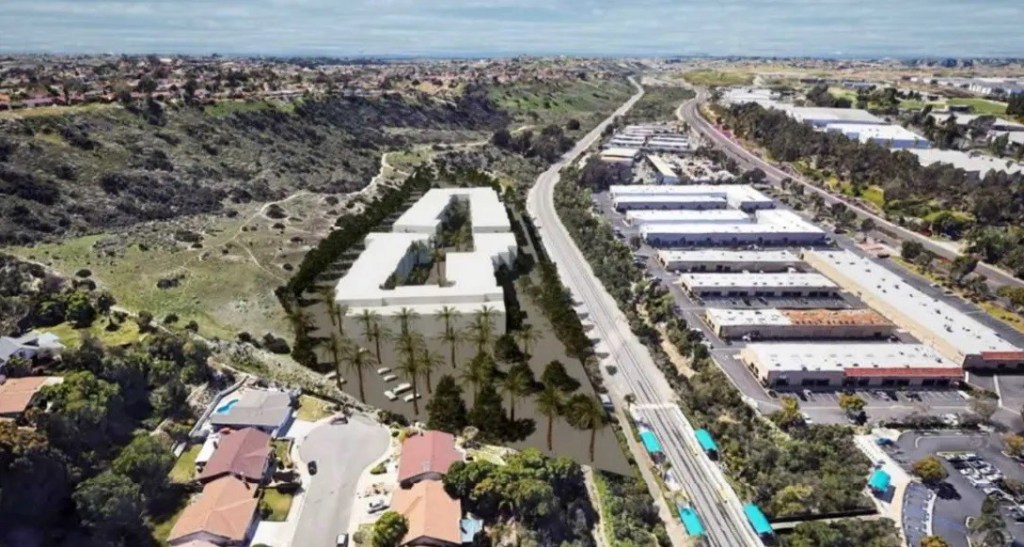

An all-affordable housing project proposed for vacant property near Oceanside’s College Boulevard Sprinter Station has been scaled back significantly, though nearby residents say it’s still too big.
The updated plan calls for 199 units in the Olive Park Apartments, a combination of one-, two-, and three-bedrooms on a little less than 11 acres of the 43.5-acre site at the western end of Olive Drive in the MiraCosta neighborhood.
As many as 282 apartments were proposed in a draft environmental impact report filed with Oceanside building officials in October of this year. A preliminary plan presented to the city in 2023 called for up to 400 senior-only apartments at what was then called Oceanside Trolley Place.
In addition to the recent 30% reduction in density, the parking included for the complex has been increased by 10 percent for a new total of 382 spaces, said the developer, Brian Mikail of Capstone Equities, during a community meeting earlier this month at El Corazon Park. Also, the maximum height of the buildings has been reduced from 57 feet to less than 50 feet.
The project’s changes were made to address concerns raised in previous meetings with neighborhood residents, Mikail said. Further modifications still could be made as the final plan is developed.
Many of the complaints were from people living in the single-family homes built in the 1970s that line Olive Drive, a short street that ends in a cul-de-sac west of College Boulevard. The only access to the development would be from the end of their street.
“Key concerns include unstable landslide deposits, severe traffic congestion, inadequate emergency access, and excessive GHG (greenhouse gas) emissions,” said resident Marco Poach, in a Dec. 17 letter to the Oceanside Planning Commission.
“Moving forward with this project poses unacceptable dangers to public safety and fails to protect environmental resources,” Poach said.
Steep slopes and the wetlands along Loma Alta Creek cover more than half of the property and make those areas unbuildable. That area will be fenced off and much of it will be preserved as natural habitat, Mikail said. The steepest slopes will be stabilized with “sheer pins” of concrete and steel sunk deep into the soil.
Studies done for the project show the nearest cross street, College Boulevard, is already congested, but the traffic from the apartments will not make that significantly worse.
The project’s design and location take aim at a number of state and local housing goals. Its location next to the Sprinter rail station makes it a transit-oriented development, which helps to meet targets for reducing greenhouse gas emissions and the miles traveled by private vehicles.
The plan includes a pedestrian walkway from the center of the apartment complex to the Sprinter station, which is 50 feet north of the development.
The Sprinter hybrid rail line began service in 2008 and has 15 stations on its east-west route through Oceanside, Vista, San Marcos and Escondido. Additional residential developments underway for several of the stations are expected to boost ridership over the years, and additional trains are planned.
“We truly are trying to design this project for the next 10, 20 or 30 years,” Mikail said
State laws use various incentives to encourage the construction of affordable dwellings that address the state-wide housing crisis. The housing shortage drives up the cost of rentals, especially in coastal communities.
“This type of housing is desperately needed in Oceanside,” Mikail said. “Ultimately, it’s workforce housing.”
To qualify as tenants, households of one to four people must have a combined income ranging from about $31,000 to $157,000 annually, Mikail said. The tenants’ income will be reviewed annually to insure they comply.
The nonprofit Las Palmas Housing, based in Encinitas, will provide support services such as job placement and counseling for the tenants, he said.
Some of the Olive Drive residents said they don’t oppose affordable housing, but they don’t want their short street turned into a driveway for the development.
“This is why we advocate for Avenida Del Oro/Oceanside Blvd to serve as the ingress and egress for the project,” said resident Meg Ley in an email. “We realize this would require collaboration with North County Transit District, which owns the parcel on the other side of the tracks. However, we believe this is reasonable since NCTD stands to benefit directly from this development.”
Mikail said adding the suggested access road across the railroad tracks would be impractical, costly and complicated for a number of reasons, such as the numerous local, state and federal regulatory agencies involved.
The apartments will be in two U-shaped buildings, three stories tall on the side facing Olive Drive, rising to four stories in the rear.
The property has been zoned for residential development since the 1980s, he said.
The project is expected to go to the Oceanside Planning Commission for approval early next year. If approved, construction could start by the end of 2025 and be completed in 2027.





